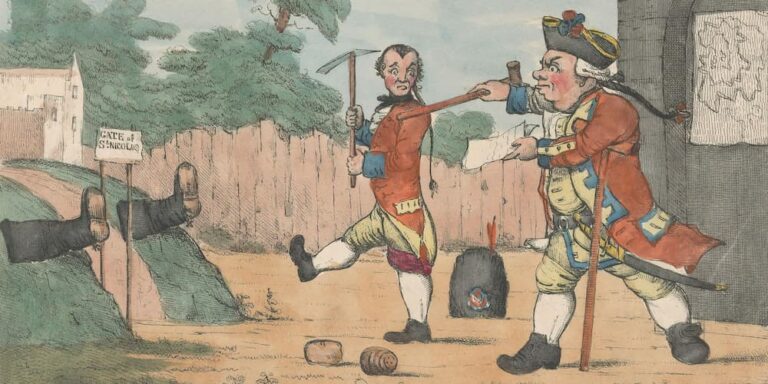At the beginning of a novel, a writer has to call up a world of his. It’s the “willing suspension of disbelief’ (Samuel Coleridge), which only happens if the situation is credible. It means that the reader accepts the story without always questioning the facts related, but he’s expected to take things seriously.
The opening chapter is likely to puzzle the reader who has some good reasons to feel disoriented. He suspects Sterne of playing a trick on him.
The novelist presents this text as a fictitious autobiography. “Opinions” means a documented essay, and “gent” (a short for gentlemen) specifies that the character occupies a high level in society. The quotation in Greek is erudite, it’s an epigraph (part of the paratext).
Playing with the rules of the realist novel
The story is presented as a jest.
A lack of chronological progression
The first-person narrator does not follow the linear, chronological progression of an autobiography. The story is “ab ovo” as Tristram is not born yet. He tells a story he cannot have witnessed: “My Tristram’s misfortunes began 9 months before he came to this world”.
The narrator seems to be improvising
He is more concerned about the workings of his mind than telling a story. The long and elaborated complex sentences seem to record Tristram’s thought process. The act of reading constantly slowed down because of the complexity of the syntax and the arbitrary punctuation: there are lots of clauses separated by colons, semi-colons, and dashes.
The first sentence ends at line 30. It is very difficult to make sense of the message conveyed: if his parents had been more concentrated as they were fiddling, he would probably have been a more handsome and happy fellow. The syntax reproduces the workings of his mind. Nothing seems to be fixed. He is writing and thinking at the same time. The narrator keeps breaking his syntactic constructions.
The narrator is not self-effacing
The narrator’s presence is conspicuous. In a realist novel, readers should not notice the narrator. Here, his presence is always reminded.
The narrator does not describe reality but what could have existed: he makes “hypotheses” and makes use of the conditional.
Fiction and essay writing
Tristram is showing his knowledge of “nature philosophy”, which is the biology of the 18th century. He alludes to the theory of the four humours: the physical condition the parents were in at the moment of procreating was decisive in the development of the child.
Sterne’s “Tristram Shandy” further blurs the lines between fiction and essay writing, not merely through its content but through its form and the narrator’s approach to storytelling. Tristram’s frequent digressions into subjects like the philosophy of Locke, the science of the time, and the art of warfare serve not just as demonstrations of his erudition but as parodic elements that challenge the conventions of both the novel and the essay. In doing so, Sterne satirizes the Enlightenment’s quest for rationality and order by illustrating the chaotic and unpredictable nature of human thought and life.
Moreover, the novel’s structure—or lack thereof—mirrors the complexity of human consciousness and the difficulty of capturing it in writing. This reflects Sterne’s parody of the essay form, traditionally seen as a means to convey clear, logical arguments. Instead, Tristram’s narrative meanders through anecdotes, philosophical musings, and meta-textual comments, which mock the essay’s aim for coherence and linear progression.
The parody of genre and form
In “Tristram Shandy,” Sterne parodies the autobiographical genre by presenting a life story that defies the expectations of completeness and order. The narrative’s frequent interruptions, which include discussions on the act of writing and the nature of narrative itself, serve to parody the conventions of both autobiography and the novel.
By focusing on the minutiae of his characters’ lives and thoughts, often at the expense of advancing the plot, Sterne critiques the novel’s traditional emphasis on a coherent and unified story. This approach not only satirizes narrative conventions but also questions the possibility of truly capturing one’s life in writing, highlighting the subjective nature of memory and the complexity of human experience.
Conclusion
Laurence Sterne’s “Tristram Shandy” stands as a monumental work of parody, challenging the boundaries between fiction and essay, narrative coherence, and the very act of storytelling. Through its innovative structure, playful use of language, and the narrator’s digressive style, the novel critiques the conventions of its time, reflecting on the artifice of narrative forms and the elusive nature of truth and meaning in literature.
Sterne’s work invites readers to question the credibility and reliability of narrators, the feasibility of accurately capturing life in writing, and the expectations placed upon literary genres. In doing so, “Tristram Shandy” does not just parody specific literary forms; it parodies the act of reading and interpretation itself, encouraging a playful yet critical engagement with literature.
By deliberately flouting the rules and expectations of the novel and essay, Sterne’s “Tristram Shandy” ultimately celebrates the complexity, absurdity, and unpredictability of life. It remains a testament to the power of literature to both mirror and mock the human condition, making it a timeless parody that continues to resonate with readers and writers alike.

